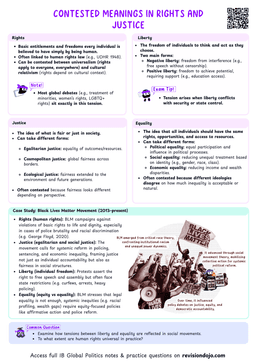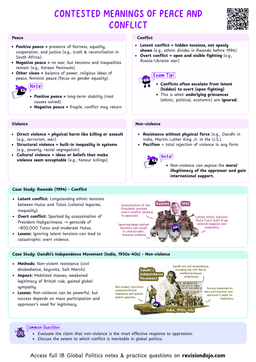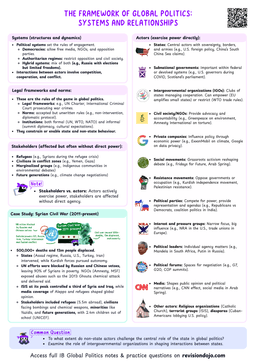Understanding Global Governance
Global governance
Global governance refers to the framework of rules, institutions, and processes that guide international cooperation and decision-making.
- It involves state and non-state actors working together to address transnational challenges.
- Unlike a world government, global governance relies on voluntary cooperation and consensus-building.
- Global governance is not a single entity but a complex web of interactions among states, international organizations, NGOs, and other actors.
Key Actors in Global Governance
- States: Sovereign entities that play a central role in negotiating treaties and implementing policies.
- Intergovernmental Organizations (IGOs): Formal organizations made up of member states created by treaties to work on shared goals to help facilitate cooperation, resolve disputes, and enforce international norms
- Non-Governmental Organizations (NGOs): Groups like Amnesty International and Greenpeace that advocate for human rights, environmental protection, and other causes.
- Multinational Corporations (MNCs): Businesses that influence economic policies and global supply chains.
- Civil Society: Individuals and grassroots movements that shape public opinion and hold governments accountable.
- The 2015 Paris Climate Agreement illustrates global governance in action, with states, NGOs, and businesses collaborating to address climate change.
The Role of Interaction in Global Governance
Interaction
Interaction in global governance refers to the dynamic relationships between actors as they negotiate, implement, and enforce policies.
- Collaboration: Working together to achieve common goals.
- Coordination: Aligning actions to avoid duplication and maximize efficiency.
- Conflict Resolution: Addressing disagreements through diplomacy and mediation.
- When analyzing global governance, consider how different actors interact and the impact of these interactions on policy outcomes.
Types of Interaction in Global Governance
1. Formal Interaction
- Treaties and Agreements: Legally binding documents that outline obligations and commitments.
- International Conferences: Gatherings where states and other actors negotiate policies.
- Treaties and Agreements: The Kyoto Protocol set emission reduction targets for participating countries.
- International Conferences: The UN Climate Change Conferences (COP) bring together governments, NGOs, and experts to discuss climate action.
- Formal interactions often involve structured processes and clear rules, but they can be slow and bureaucratic.
2. Informal Interaction
- Networks and Coalitions: Groups of actors that collaborate outside formal institutions.
- Public-Private Partnerships: Collaborations between governments and businesses to address specific issues.
- Networks and Coalitions: The C40 Cities Climate Leadership Group is a network of cities working to combat climate change.
- Public-Private Partnerships: The Global Alliance for Vaccines and Immunization (GAVI) brings together governments, pharmaceutical companies, and NGOs to improve vaccine access.
- Informal interactions are often more flexible and innovative, allowing actors to adapt quickly to changing circumstances.
Challenges in Global Governance Interaction
- Power Imbalances: Dominant states or organizations may influence decisions, marginalizing weaker actors.
- Lack of Enforcement: Many global agreements rely on voluntary compliance, leading to inconsistent implementation.
- Conflicting Interests: Divergent priorities can hinder cooperation and lead to stalemates.
- The failure of the Doha Round of WTO negotiations highlights how conflicting interests between developed and developing countries can impede progress.
The Future of Global Governance Interaction
- Increased Multilateralism: As global challenges become more complex, there is a growing emphasis on multilateral cooperation.
- Digital Diplomacy: Technology is enabling new forms of interaction, such as virtual summits and online collaboration.
- Rising Role of Non-State Actors: NGOs, MNCs, and civil society are playing an increasingly important role in shaping global governance.
- Identify three key actors in global governance and explain their roles.
- How do formal and informal interactions differ in global governance?
- What are some challenges faced by global governance in addressing transnational issues?


